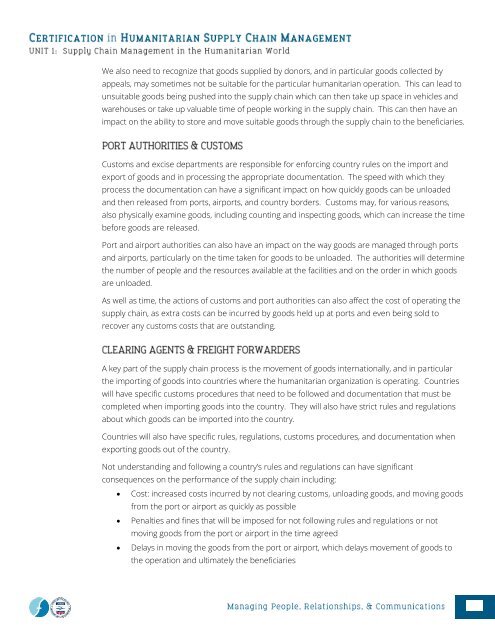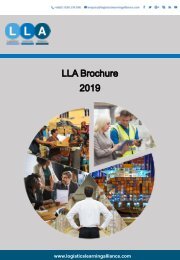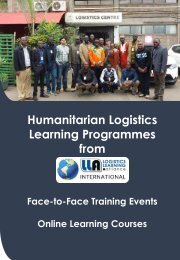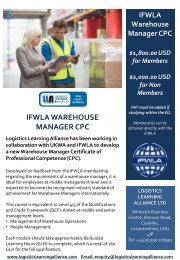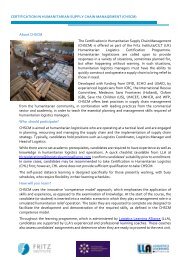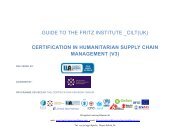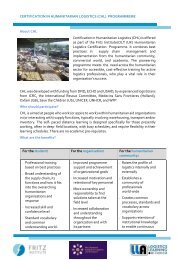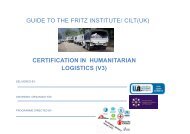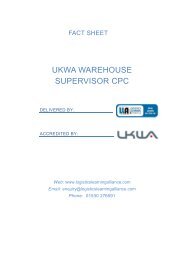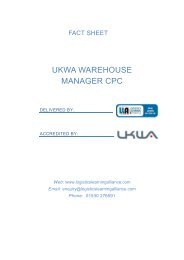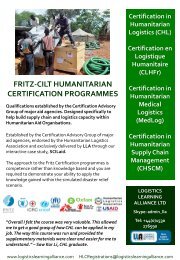CHSCM 3.0 - Unit 1 - SCM in the Humanitarian World
Learning Materials for Unit 1 of the Certification in Humanitarian Supply Chain Management (CHSCM).
Learning Materials for Unit 1 of the Certification in Humanitarian Supply Chain Management (CHSCM).
Create successful ePaper yourself
Turn your PDF publications into a flip-book with our unique Google optimized e-Paper software.
We also need to recognize that goods supplied by donors, and <strong>in</strong> particular goods collected by<br />
appeals, may sometimes not be suitable for <strong>the</strong> particular humanitarian operation. This can lead to<br />
unsuitable goods be<strong>in</strong>g pushed <strong>in</strong>to <strong>the</strong> supply cha<strong>in</strong> which can <strong>the</strong>n take up space <strong>in</strong> vehicles and<br />
warehouses or take up valuable time of people work<strong>in</strong>g <strong>in</strong> <strong>the</strong> supply cha<strong>in</strong>. This can <strong>the</strong>n have an<br />
impact on <strong>the</strong> ability to store and move suitable goods through <strong>the</strong> supply cha<strong>in</strong> to <strong>the</strong> beneficiaries.<br />
Customs and excise departments are responsible for enforc<strong>in</strong>g country rules on <strong>the</strong> import and<br />
export of goods and <strong>in</strong> process<strong>in</strong>g <strong>the</strong> appropriate documentation. The speed with which <strong>the</strong>y<br />
process <strong>the</strong> documentation can have a significant impact on how quickly goods can be unloaded<br />
and <strong>the</strong>n released from ports, airports, and country borders. Customs may, for various reasons,<br />
also physically exam<strong>in</strong>e goods, <strong>in</strong>clud<strong>in</strong>g count<strong>in</strong>g and <strong>in</strong>spect<strong>in</strong>g goods, which can <strong>in</strong>crease <strong>the</strong> time<br />
before goods are released.<br />
Port and airport authorities can also have an impact on <strong>the</strong> way goods are managed through ports<br />
and airports, particularly on <strong>the</strong> time taken for goods to be unloaded. The authorities will determ<strong>in</strong>e<br />
<strong>the</strong> number of people and <strong>the</strong> resources available at <strong>the</strong> facilities and on <strong>the</strong> order <strong>in</strong> which goods<br />
are unloaded.<br />
As well as time, <strong>the</strong> actions of customs and port authorities can also affect <strong>the</strong> cost of operat<strong>in</strong>g <strong>the</strong><br />
supply cha<strong>in</strong>, as extra costs can be <strong>in</strong>curred by goods held up at ports and even be<strong>in</strong>g sold to<br />
recover any customs costs that are outstand<strong>in</strong>g.<br />
A key part of <strong>the</strong> supply cha<strong>in</strong> process is <strong>the</strong> movement of goods <strong>in</strong>ternationally, and <strong>in</strong> particular<br />
<strong>the</strong> import<strong>in</strong>g of goods <strong>in</strong>to countries where <strong>the</strong> humanitarian organization is operat<strong>in</strong>g. Countries<br />
will have specific customs procedures that need to be followed and documentation that must be<br />
completed when import<strong>in</strong>g goods <strong>in</strong>to <strong>the</strong> country. They will also have strict rules and regulations<br />
about which goods can be imported <strong>in</strong>to <strong>the</strong> country.<br />
Countries will also have specific rules, regulations, customs procedures, and documentation when<br />
export<strong>in</strong>g goods out of <strong>the</strong> country.<br />
Not understand<strong>in</strong>g and follow<strong>in</strong>g a country’s rules and regulations can have significant<br />
consequences on <strong>the</strong> performance of <strong>the</strong> supply cha<strong>in</strong> <strong>in</strong>clud<strong>in</strong>g:<br />
• Cost: <strong>in</strong>creased costs <strong>in</strong>curred by not clear<strong>in</strong>g customs, unload<strong>in</strong>g goods, and mov<strong>in</strong>g goods<br />
from <strong>the</strong> port or airport as quickly as possible<br />
• Penalties and f<strong>in</strong>es that will be imposed for not follow<strong>in</strong>g rules and regulations or not<br />
mov<strong>in</strong>g goods from <strong>the</strong> port or airport <strong>in</strong> <strong>the</strong> time agreed<br />
• Delays <strong>in</strong> mov<strong>in</strong>g <strong>the</strong> goods from <strong>the</strong> port or airport, which delays movement of goods to<br />
<strong>the</strong> operation and ultimately <strong>the</strong> beneficiaries


